Unfortunately, the Veterinary Medicines Directorate contacted me to tell me it was against the law to advertise this wormer since it was classed as ‘Prescription Only Medicine – Veterinarian, Pharmacist, Suitably Qualified Person (POM-VPS)’. and that ‘Products classed as POM-VPS can only be advertise in publications aimed at professional bodies and not to the general public’.
I was surprised they considered this page as advertising so I spoke to them and they advised me that I should not use the product’s brand name but could say ‘A product containing Flubendazole‘. As a result, I have removed the product name.
Before using medication to worm your chickens, it is best to check they need worming first by using a Worm Count Kit like this one. This is a simple test where a sample is sent off by post and the results are returned to you (usually by email) and will advise you whether or not you should worm your chickens.
In the United Kingdom, a product containing the anthelmintic (wormer) Flubendazole is currently the only licensed in feed product available for chickens. It is very effective at killing worms and their eggs. Worms can cause a huge amount of damage to chickens and cause many health problems. As a rule of thumb, if I have a sick bird, the first thing I consider is whether or not she was wormed recently before exploring other avenues because so many signs of illness can be as a result of worms.
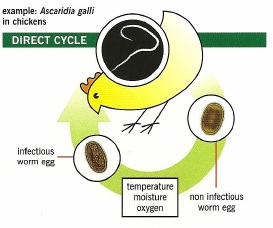
The Direct Life Cycle
Worms lay thousands of eggs in a day that are not always visible in droppings. Eggs then either get picked up by birds scratching around the floor, eating from the ground or in their litter when housed (i.e. picked up directly) or are eaten by earthworms or other ‘hosts’ and passed on to our birds when they themselves get eaten (i.e. indirectly picked up).
These two routes of infection are called the ‘Direct Life-cycle’ and the ‘Indirect Life-cycle’ and can be understood better from the diagrams show that are kindly supplied by Elanco (formerly Janssen Animal Health) where two examples of direct infection and one indirect are shown.
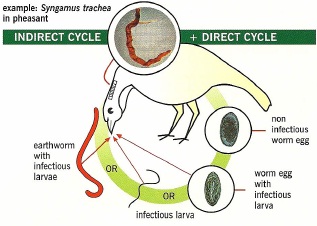
The Indirect Cycle
Worm eggs are destroyed by heat, drought, a hard frost and UV from direct sunlight. For this last reason, I keep grass short in runs over the hotter summer months where my hens graze so that worm eggs can be destroyed. Over the colder winter months or below 10 degrees Centigrade. Worm eggs cannot mature and therefore cannot become infectious so I test my hens with a worm count kit and worm if necessary in the Autumn as the temperature starts to drop and in the Spring when worms become active again.
This product containing Flubendazole that I’m not allowed to name is very effective and after the recommended 7 day treatment, chickens are free of worms and eggs. One thing to remember is that the thousands of eggs deposited via droppings (or coughed up in the case of Gape Worm) are still present in the environment so if the worm infestation is bad, you will need to repeat treatment after 3 weeks to break the cycle before the newly acquired worms (picked up from the eggs) have a chance to mature and lay eggs themselves.
The withdrawal period stated on the tub is nil for eggs from laying hens. This means that you can continue to eat eggs whilst your chickens are being wormed. I’m sure you won’t be eating your hens but they must not be slaughtered for human consumption during treatment. Treated birds may be slaughtered only after 7 days from the last treatment.
Where to buy
If you have a small flock, there is a 60g pack sufficient to treat around 20 large chickens. This comes with a handy little measuring scoop so that you can get the quantity right. One 6 g scoop treats 2 kg of food for chickens. This is the simplest way to worm and if you mix it as I suggest above with a little oil, you can be sure your chooks are getting the required amount. There is also a 240g tub or gamekeeper pack which is more suited to 50 birds or more and lasts longer.
Because of the tight regulations and a license that sellers need to hold (costing over £600 I was told by one company), both of these products are becoming harder and harder to buy. I bought a 60g tub in 1998 and paid £12.50. A year ago I bought another one and it was £70! Serious money.
The product containing Flubendazole can also be purchased pre-mixed in layers pellets on websites such as Amazon in 5 or 20Kg bags which is handy if you don’t want to mix it yourself.
I haven’t seen many places selling this product containing Flubendazole online and vets don’t usually stock it unless they specialise in poultry. The ‘regulations’ are pushing people to go to their vets or other suitably qualified people yet in fact if you chat to chicken keepers, they are being offered offer other large animal wormers containing Ivermectin instead that are often bought in large packs for use on farm animals. These haven’t been tested on chickens so you end up with vets advising anything from a 7 to 30 day withdrawal periods for eggs (depending on the view of the vet of what will be ‘safe’) and although this is perfectly legal, my personal opinion is that this is wrong when there is a tested product available.
How I mix this product containing Flubendazole
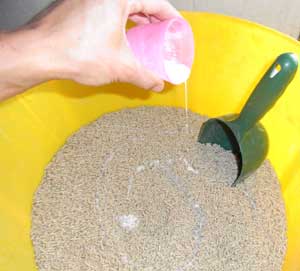
Adding the ‘paste’ to the layers pellets before mixing well
If you but the pack or tub then it will come as a powder that must be mixed with your chickens feed. In order to get this to stick to my layers pellets, I mix it in a small tub with a little Olive or Cod Liver Oil. The ‘paste’ that this makes can then be poured over the right amount of (weighed) pellets in a bucket and mixed well. It sticks to the pellets and won’t fall to the bottom of the bucket like I suspect some of the powder would without the oil.
Remember to wear disposable gloves for safety (yes I know we forgot in the photos!) and follow the ‘operator warnings’ given by the manufacturers below at the end of this page. Remember to dispose of empty containers in the domestic refuse. Used containers should not be recycled.
Pre-mixed layers pellets of course are easier and layers feed lasts for around 6-8 months before starting to spoil so you can use it for further treatments during this time.
How often do I worm my Chickens
As you will see from my routine list of jobs and from what I said above, I check my chickens for worms using a worm count kit twice per year as a preventative measure. Following the results, I worm if necessary but I also worm new birds that we add to our flock or if I become suspicious of worms / ill thrift.
I rotate the runs my birds use so there is no build up of worms. I would suggest you check for worms every 3 months if your birds are on the same ground continuously.
In between times, I sometimes use Verm-X and Apple Cider Vinegar to help keep worm numbers down as well as keeping the grass short in the summer months to allow UV from the sun to kill worm eggs.
You can read more about worms on my worming chickens page

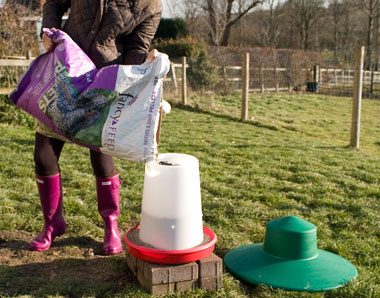
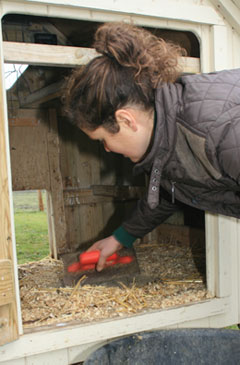
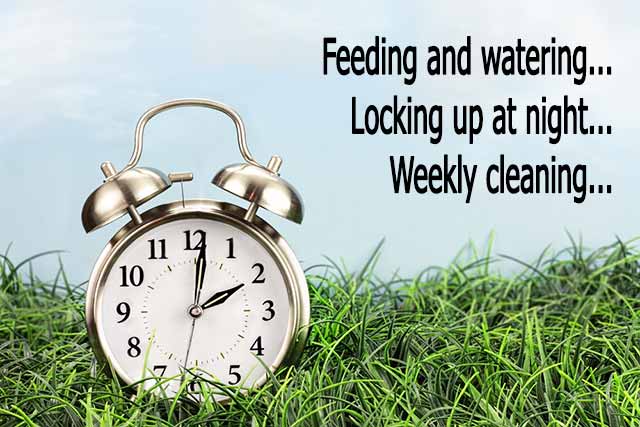
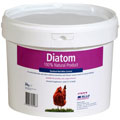
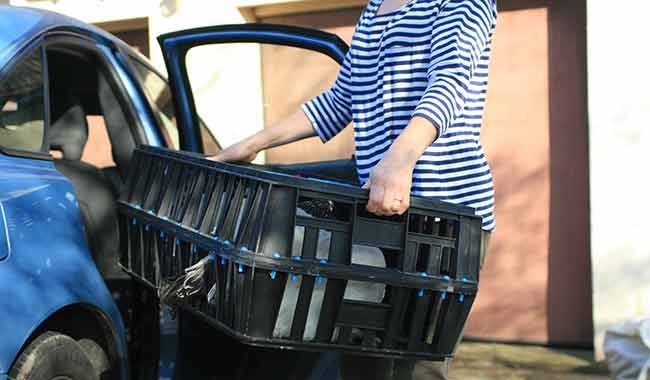
Hi. I just looked on amazon about buying Flubenvet and ur asks you if the chickens are the only animals on the domestic property. I have a German Shepherd dog. Am I still able to use Flubenvent? I’m new to all of this. We got our chickens two weeks ago. They are 20wks old. We’ve got the herbal worming pellets which we are going to use monthly. Going by what you have said we need Flubenvent twice a year etc. is it safe to use with a family dog around?
Yes it is as far as I am aware. I can only think they are checking you are only intending to use it on the target species?
Hi, I have 2 hens and 1 rooster, a couple days ago my parents saw worms in there droppings and I’m wondering how I can cure this. Can the worms be harmful to my chickens? They are all at least a year old and never have they had this problem occur before. They are my first chickens and I really want them to be fine. What do you recommend me to do?
I really appreciate taking your time to help – Breanna
You should worm them. Worms can cause terrible damage to them and eventually death.
Flubenvet is the only licensed in feed wormer. There is no withdrawal period for eggs if given as instructed in the label.
Have started giving my hens their first treatment of Flubenvet but the one girl that really seems to need it at the moment doesn’t appear to be eating the food. I’ve seen an old posting where you say you can add a small amount to a grape or something or try a syringe in the beak. Don’t have a problem with trying that but its the quantity I’m not sure about – what exactly is a ‘small amount’!!
The problem is it is specified as a dose to a certain amount of food so depending on the hens size will depend on the dose.. At the amount instructed by the pack, there is no withdrawal period for eggs. Once you start estimating an amount on a grape, you won’t be able to assume safe consumption of eggs as you are ‘off label’ as the vets say.
Unless the hen is really infected with worms, it is unlikely she won’t eat, she may just be lower in the pecking order and eat after the others later in the day.
I would only (try) to put some on a grape and feed it if it’s really necessary – really this should be done with the advice of your vet who can advise a withdrawal period for the amount you use (7 days usually minimum)
Sorry, should also have asked, if I get a syringe in the beak is this done just the once or should that be done for the 7 days??
You do have to be careful with a syringe, not to put it into the airway. Better is feeding on a grape or other treat. The advice on the label suggests 7 days but this is when mixed with feed – again you are best getting advice from your vet, it would be illegal for me to suggest / prescribe…
Hi, great article.
I have just ordered some Flubenvet after seeing a worm in my hen’s droppings.
Do you know if the hen’s eggs are safe to eat, or can the parasite be passed to humans through the eggs?
It is safe to eat eggs if Flubenvet is administered at the stated dose on the label. Chicken worms cannot be passed on to humans.